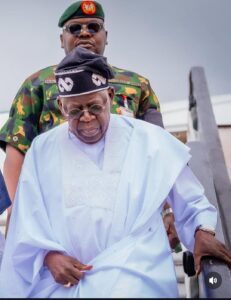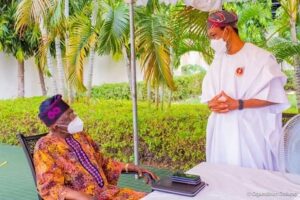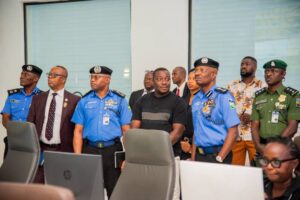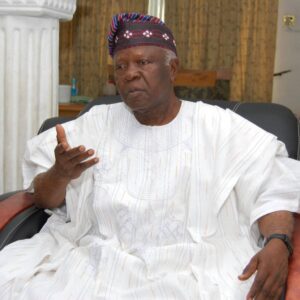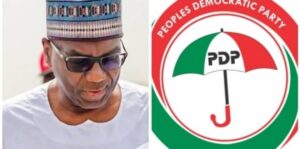Aburi Accord & Reality Of Igbo Presidency In 2023 By Bolaji Akinyemi
The Igbo nation seems to be the beautiful bride of political suitors in the race to the presidency in 2019.
Governor Okorocha was the first person to encouraged the Igbo’s to stay with Buhari in 2019 so that presidency can come to the Igbo’s in 2023.
Then came the embattled former governor Orji Uzor Kalu of Abia state, who in quest to get the EFCC off his back, jumped into the APC voyage, singing the soprano part of the treble already sang by Okorocha.
Former governor Chris Ngige will also lend his voice to the Buhari song of support in 2019 for Igbo presidency in 2023.
Sensing the thrust of the music, Babatunde Raji Fashola, former Governor of Lagos State, came with a discordant tune requesting the Yoruba’s of South West Nigeria to out number the Igbo’s in their support for Mohammadu Buhari’s re-election in 2019, so that presidency can return to the region.
The place of the Igbo nation as the bride who will determine the King come 2019 got a boost when the Secretary to the Government of the Federation, Mustapha Boss charged the Igbo’s to give their votes to Buhari in 2019, so that Buhari can make the Igbo’s president in 2023.
Pastor Yemi Osibajo beneath the candor of his office will also throw a tribal card on the table, when he went knocking on the palace door of the “Iku Baba Yeye” Oba Lamidi Adeyemi, the Alafin of Oyo Kingdom.
The Reality of 2023 is that fairness demands an Igbo Presidency. The choice of Peter Obi as Atiku’s vice presidential candidate is a strong positioning for the Igbo nation, which has thrown up the reactions and counter reactions. Of necessity is the need for the Igbo nation to reach out and form accord across tribal divide to ensure 2023 does not elude them.
The Igbo national republican attitude has not help matter. Before the colonial exploration, the general belief among the Igbo’s was that every man was his own leader which triggered self dependency and made hardwork the natural virtues among the Igbo’s. This however has its dackside as it literally translated to the inability of an Igbo man to forge an accord. Partnership in business became almost estranged in the Igbo man, preferring to run solo than team up.
The following ideological traits were already established in the Igbo nation pre colonial era which are:
- Igbo society recognized no constitutional leadership or a leader figure.
-
A value system that favoured personal achievement, financial clout as well as “ka’anyi sieme”.
-
The society was naturally hesitant to change
-
A people that accommodates and encourages individuals effort to freedom and self leadership, hard work, a harsh justice system and a discriminating clan system.
It is of necessity to take our descent into the history of the Igbo nation. From which the Igbo nation must pick the necessary lesson she has refused to learn from history in order to strive for her place in the Nigeria nation.
IGBO’S AMALGAMATION INTO NIGERIA.
Blending with the new identity has been a challenge to the Igbo nation, another very strong point for restructuring and regional governance. The Igbo nation had its unique identity which was at variance with the other tribes that has become part of the big family of a nation called Nigeria. The Yoruba’s had an organized system of leadership which was pro communal than pro individual. This naturally threw up the perception of an Igbo man as being proud when his individualistic nature is on display. The Hausa Fulani has an oligarchy structure, which was unaccommodating of the nature of the Igbo man who in the context of their own nature they perceived as domineering and ambitious. The failure of the Igbo nation at understanding its nature and the need to bridge the disconnect with his new family members within the Nigerian nation is largely responsible for the marginalization of the Igbo man. This disconnect generated the rancor which degenerated into a coup that will literally seal the fate of the Igbo man in the experiment called Nigeria.
1966 COUP; THE LOSS OF A NATION WITHIN THE NATION.
ON 17 JANUARY, 1966, the former civilian Federal Government of Nigeria were forced to hand over power to the Armed Forces. Major-General J. T. U. Aguiyi-Ironsi as the General Officer Commanding the Nigerian Army assumed the headship of the Federal Military Government and established the Supreme Military Council. Subsequently, on 24 May, 1966, he promulgated the Decree No. 34 putting into effect the decisions of the Supreme Military Council to establish a centralized administration for the country. Six days later widespread violence and riots broke out in Northern Nigeria. Thousands of Easterners were massacred.
On 29 July, 1966, a group of Northern Nigerian Army personnel kidnapped and, as was later revealed, murdered Major-General J. T. U. Aguiyi-Ironsi, the Supreme Commander and Head of the Federal Military Government. At the same time they attempted to annihilate all Eastern Nigerian Army Officers and men at Ibadan, Abeokuta and Ikeja in Western Nigeria and at Kaduna, Zaria and Kano in Northern Nigeria. Nearly 200 officers and men of Eastern Nigeria origin were slaughtered. Those who escaped but later returned to their posts following assurances of safety were also murdered. The pogrom was soon extended to Eastern Nigerian civilians resident in Northern Nigeria, Lagos and the West; and by September, 1966, the killings and molestations carried out by the combined forces of Northern Nigerian soldiers and civilians had assumed such large proportions that Easterners everywhere outside the East sought protection within their home Region.
All these massacres, which claimed the lives of over 30,000 Easterners, jolted the conscience and aroused the indignation of the world. They were also fraught with tragic consequences for the country. The bond of comradeship which had previously held the Nigerian Army together completely severed. Mutual fear, suspicion and hatred have prevailed to such an extent that Army Officers and men Eastern Nigeria origin cannot now co-exist with those of Northern Nigeria origin. The massive movement of population which has resulted from these tragic events has also posed serious economic and social problems.
The disappearance of the Supreme Commander on 29 July, 1966, demanded that the next senior Military Officer should temporarily assume command of the Army and the headship of the Federal Military Government until the Supreme Military Council should determine the leadership of the Army and the country. But on 1 August, 1966, Lt.-Col. Yakubu Gowon, Chief of Staff, Army Headquarters, announced that he had assumed the Offices of Supreme Commander and Head of the Federal Military Government, although there were at least half-a- dozen Military Officers who were senior to him. The Military Government of Eastern Nigeria found it impossible to recognize this seizure of power; nevertheless it was prepared to co-operate with Lt.-Col. Gowon in order to prevent further bloodshed.
THE ABORI MEETING.
The Military Government of Eastern Nigeria thought that Gowon events were taking a dangerous turn and that it was essential for the Supreme Military Council, which had not been convoked since 29 July, to meet. Since the situation in the country made it impossible for the Military Governor of the East to attend a meetings in any area occupied by Northern troops, various suggestions of alternative venues was put forward by him. So anxious indeed was he to attend the meeting that he purchased an executive plane to facilitate his journey to any acceptable venue. For long, however, his suggestions were treated with levity by Lt.-Col. Gowon, but eventually it was unanimously agreed that the meeting should hold outside Nigeria.
The Supreme Military Council subsequently met at Abori, Ghana, on 4 and 5 January, 1967. It had been recognized by the Military leaders that the meeting would:
(a) Resolve the question of leadership within the army, restore the chain of command which had become badly disrupted, and examine the crisis of confidence amongst the officers and soldiers which had rendered it impossible for them intermingle;
(b) Evolve ways and means of carrying on the responsibility of administering the country until a new constitution had been determined; and
(c) Tackle realistically the problems of displaced persons. These considerations were reflected in the agenda which was agreed upon by members of the Supreme Military Council.
The Military Government of Eastern Nigeria was represented at the meeting of the Solicitors-General held in Benin on 14 and 15 January. The Eastern delegation received full briefing in the light of the Abori decisions to which its views strictly adhered. Since some other delegations had not been fully briefed it became necessary to refer a number of issues back to the Supreme Military Council. One of the most important was section 69 of the Nigerian Constitution in respect of which the Report of the Law Officers’ meeting reads—
“As regards the powers of the Federal Military Government vies-a-vies the Regional Government, all the Law Officers, excepting those from the East, are of the view that effect would be fully given to the Accra decision in this regard by repealing section 3 of Decree No. 1 and restoring the provisions of the suspended section 69 with necessary modifications whereby the Federal Military Government will now have power to make Decrees to the following extent:
(a) With respect to the Federal Territory of Lagos, on any matter whatever;
(b) With respect to the whole of Nigeria, or any part thereof (other than Lagos), on
matters included in the Exclusive Legislative List and the Concurrent Legislative List; provided that where there is an inconsistency between a Federal Decree on a Concurrent matter and a Regional Edict on the same matter, the Federal Decree will prevail.
“Under this arrangement the Military Governors will have no power to make Edicts on matters on the Exclusive Legislative List but will have powers to make Edicts on matters in the Concurrent Legislative List and on residual matters.”
“The view of the Eastern Law Officers is that the introduction of the element of Regional consent in Federal legislation must necessarily modify the position as it was before 17 January in the sense that there will be a lacuna in the legislative activities of both the Supreme Military Council and the Regions where consent is not given. It appears, therefore, to be the intention of the Accra decision that such a lacuna should be filled by the Regions. With respect to matters on the Concurrent Legislative List, it is their view that the Regions can legislate in relation to Federal Law.”
. The failure of Lt.-Col. Gowon to adhere to the decisions unanimously reached at Aburi is only the latest evidence of his bad faith, inconsistency and lack of realism.
On the first day of his seizure of power he had pleaded for co-operation from the East Military Government, and had promised to retain power only temporarily in order to normalize the extraordinary conditions created by himself and his fellow Northerners, military and civilian. Thereafter the Military leaders were to meet and decide on the leadership. Lt.-Col. Gowon has never fulfilled that promise. The breach of his promise to see to the return of arms and ammunition by Northern soldiers evacuated from the East has already been mentioned in paragraph 8 above. Lt.-Col. Gowon also assured the Military Government of the East in August, 1966 that he would stop the killings in the country, but these killings subsequently increased in organization and ferocity until they reached the proportions of a pogrom. He moreover promised that the inquiry set up by Major-General Aguiyi Ironsi into the May massacres of Easterners in Northern Nigeria would “certainly go on as scheduled”. Nothing has been heard again about this inquiry ever since. So also most of the difficulties preventing the return to normal conditions in the country have stemmed from Lt.-Col. Gowon’s bad faith in not implementing the unanimous decisions reached by the representatives of the military leaders at their meeting in Lagos on 9 August.
Early in September 1966, armed soldiers of Northern origin from Ibadan raided Benin Prison and removed soldiers who had been detained as a result of their
alleged involvement in the attempted coup of
15 January. The Northerners among the detainees were set free and repatriated to the North; the remainders, mainly Easterners, were murdered under brutal circumstances. And although Lt.-Col. Gowon gave assurances that the murderers would be brought to justice, so far the perpetrators of the atrocities have gone unpunished.
It was exactly this same sort of bad faith that Lt.-Col. Gowon exhibited in September, 1966. In his opening address to the Ad Hoc Constitutional Conference, he had himself instructed the delegates to choose one of the following alternatives in formulating a new Constitution for Nigeria:
“(a) A Federal system with a strong Central Government;
“(b) A Federal system with a weak Central Government;
“(c) A Confederation ;or
“(d) An entirely new arrangement which may be peculiar to Nigeria.”
BRIDGING THE ABURI ACCORD.
At the same time Gowon disavowed any intention of dictating to the country a particular constitution. When, however, he saw that the delegations were veering towards the second or third alternative, he adjourned the conference indefinitely. He thereupon announced that “the idea of a temporary confederation is unworkable” and that he was appointing “a drafting committee” to prepare a constitution which “will reflect the generally expressed desire for a stable federation”. it will be recalled, however, that the delegations to the Ad Hoc Conference went to Lagos in September, 1966, after extensive consultations among the people in each Region. Thus each delegation went with a mandate representing the “expressed desire” of its people. But, true to type, Lt.-Col. Gowon placed a dubious construction on the submissions of the delegations to suit his purpose and that of his advisers.
Contrary to the decisions at Aburi recruitment into the Army has continued in different parts of the country except the East; contrary to these agreements, Lt.-Col. Gowon has proceeded to appoint Ambassadors without reference to the Supreme Military Council; contrary to the agreements, purchase and importation of arms have continued. Lt.-Col. Gowon unilaterally postponed the meeting of Military officers to discuss the reorganization of the Army as agreed at Aburi. The proposed meeting of Finance officials on the problem of rehabilitation of displaced persons has not even been held because Lt.-Col. Gowon’s Finance Permanent Secretary does not think that such a meeting will serve any useful purpose. –
In the light of the foregoing and since there is clearly no hope of a change of attitude on the part of Lt.-Col. Gowon, the East Military Government considers that the time has come when it must take a final stand against a regime which cannot abide by agreements voluntarily arrived at. The Military Government of the East is irrevocably committed to the task of ameliorating the suffering of its struggling people and providing them with the peace, order and good government which are their overriding needs. To this end the Government will publish shortly its future policy towards the implementation of the Aburi agreements.
UNIQUENESS OF THE IGBO PEOPLE.
Among the different ethnic groups in Nigeria, the Igbo are without a doubt, one of the most remarkable. So remarkable, indeed, that some have even traced their ancestry to biblical Israel, as the far-flung descendants of Jacob, the Jewish patriarch. Gad, Jacob’s seventh son, is said to have had three sons who settled in South-eastern Nigeria.
These sons; Eri, Arodi and Areli, are believed to have fathered clans in Igbo-land and to have founded such Igbo towns as Aguleri, Arochukwu, Owerri and Umuleri.
Even the bitterest adversaries of the Igbo cannot but admit that, as a people, they are very resourceful and ingenious. Indeed, this has often been the cause of their envy and dislike by others. However, more enlightened non-Igbo Nigerians see this as a cause for celebration. While today, the centre-point of Nigeria’s manufacturing is situated in the Lagos/Ogun axis, there is no doubt that the real locomotive of Nigeria’s indigenous industrialization lies farther afield in Aba and in the mushrooming cottage-industries of the Igbo heartland.
What the Igbo tribe should rather do.
Nd’igbo must review the aforementioned factors that has been carried over into Amalgamated Nigeria and which has largely influenced them since because every one of those factors put together are the real pillars that has supported the marginalization of self. Take for instance the lack of constituted leadership or recognition of a leader figure in the Ibo ideology. Not a few will agree that such ideology will do more harm than good to any ethnic group especially where there existed other ethnic groups equally competing for relevance.
On the other hand, the presence of those other ethnic groups where there existed the idea of recognition for a leader figure, should have propelled any other forward looking ethnic group to adopt their own too if prevailing realities demanded thus. The structure of Amalgamated Nigeria is such that every other ethnic group needed to have a leader because as there existed a central government; not all the members of any ethnic group was to come forward as the face of the said group. Surely, there was need for a figure to represent at the center.
Unfortunately, Nd’igbo has found it difficult to adjust to this reality and that is why there was so much desperation in a bid to represent every time there was an opening for a leader to emerge. No one thinks the other could do a better job of representing if allowed because everyone believed he was his own leader. Although, there are signs that the present leadership of Ohaneze Nd’igbo was poised to address this anomaly, the failure of leadership in Ibo land is largely due to the wrong leadership conception held by the people. We can see why Nd’igbo are largely behind politically. This play out when the PDP presidential aspirant, Alh. Atiku Abubakar, announced Mr. Peter Obi as his running mate, the opposition and contention within the Igbo nation was an embarrassment to the whole Nigeria. It was like when would this people learn their lesson.
Play back to 2014 when Yemi Osibajo, a man of lesser political clout was picked by the then presidential candidate of the APC Mohamodu Buhari no such contingency raged in south west Nigeria. The Igbo must learn how to rally around their own.
Back in pre-colonial times, the Igbo society recognized no leader in the true sense of it but they favored the idea of a council of elders as the governing body and no one elder was superior to the other. In today’s Nigeria and indeed the rest of the world, a representative is needed at the centre to indicate the existence and the presence of a said ethnic group. As such, what should Nd’igbo have done? The answer is simple, they should rebrand so as to effectively blend with contemporary politics.
The negative trend occassioned by the value systems held by Nd’igbo from pre-colonial times which today’s societies frown at is also due for a review because the quest to achieve has turned the average ibo in contemporary Nigeria into an individualistic minded kind of Nigerian who will do all he could to earn the praise of men at all cost. The truth is that there is the feeling that the Ibo in today’s Nigeria due to ego, does not understand where individualism stopped or where collectivism began.
Every time an issue of ethnic importance was up for discussions, there was the tendency for one or more groups to fight over whose ideas was to be adopted in the end. And as always, the in-fighting that frequently ensued exposes the tribe’s agenda for adulteration by outside forces whose ambitions cannot be said to align with those of Nd’igbo. Then rather than correct self-marginalization, the ibos continued to be miffed at those outside forces without realizing that it was their failure to put their house in order that exposed them to public riddle in the first instance.
Again, let me cite the case of the 4th Republic senate presidency. An important position as this, which every other tribe in Nigeria grabs with both hands was made by Nd’igbo to look like it was of no value. Since the Obasanjo presidency, Nd’igbo has so far seen the great dignity that the other tribes attached to that position. The office of the senate president of the federal republic of Nigeria has been made by the Northcentral geopolitical zone to reflect the power and the aura it carried. Does this not suggest that the origin of ibo marginalization was self-marginalization?
But are any of these troubling Nd’igbo in the sense of to trigger a rebrand in their ideology? The answer to this is NO. It is NO because of another factor – the reluctance to change or adjust. Contemporary ibos can easily excuse themselves by accusing the other members of the Nigerian federation as the brains behind their predicament instead of accepting the reality that there was need to rebrand. Author John C. Maxwell in his book Winning with People says that “We can give no greater gift to others than putting them at ease.” This means that being at ease with ourselves helps others be at ease with us.
Today, Ibo marginalization has been fingered as the reason for the agitation by IPOB and MASSOB for a separate country. If Nd’igbo understood what progress was all about; they would have also known that change was a very important part of progress. What is this so-called Ibo marginalization all about? Who can explain it? Where can it be found? Has the Ibo tribe been denied the rights to eat 3 square meals a day? Is there any policy that prohibited polygamy or number of children against Nd’igbo in Nigeria? Is there any federal law that stopped Nd’igbo from giving their children the very best of education in Nigeria?
Is there any policy that stopped Nd’igbo from traveling from state to state in Nigeria for business or for pleasure? Is there any federal policy that insisted that Nd’igbo in politics must fight one another for political positions? Is there any federal law that empowered godfatherism, looting of treasury, or clueless leadership only in Southeast Nigeria? What is this ibo marginalization all about? As a youth, I know that Ndigbo and by extension the Nigeria federation is going through a lot lately especially since the Civil War but to interpret this challenges as personal, to me was likely to achieved the opposite of whatever was intended to be addressed.
The recent IPOB/Army clash that took place in Aba in September 2017 could have triggered another senseless assault against Nd’igbo and put their hard-labored over 44 trillion naira investment in jeopardy. Quite troubling (for me) was the fact that in the midst of the agitation by IPOB and their eventual clash with the Nigerian Army, the Ibos in the North, the West and the Diaspora simply applauded Mr. Nnamdi Kanu without realizing that secession (given the factors earlier mentioned here) was a wrong approach.
The Igbo’s have not but single handedly built back their region from nothing, but have also contributed to National development through commerce and integrity than any other. The Igbo’s must necessary look involved, make adjustments and take the advantage that is thrust at them at realizing their desire to accept the presidency which they can never realize if they allow their individualistic nature to come ahead of their need to follow a common front.
Though the Abori accord failed majorly because of the apathy and insincerity of the Federal Government. The 2023 election will be driven by the readiness of the Igbo nation to embrace other tribes and her skills at deploying political dynamics to ensure that the strategic position offered her is consolidated. A bird in hand they say is worth more than 10 in the forest. Buhari presidency as positioned already favors the emergence of a south westerner. Her endless desire for the presidency must be governed by reality. May the igbo nation be guided by wisdom in 2019. Happy 52 anniversary of Aburi Accord (4th & 5th January 1967- 5th January 2019).
Dr Bolaji Akinyemi is the President PVC- NAIJA www.pvcnaija.org

